Which dust? by Fereydoun / Fereydoon / Fereidoon Moshiri
One of the remarkable characteristics of Fereidoun Moshiri was the fresh atmosphere he would create in his writings. Probably, you’ll not find such epic rhythms here as we see in Shamlu. And maybe, his works are far from the complexity of form and meaning that we find in Nima. But, his effort in creating smooth, sensible, and descriptive themes and scenario was so attractive and strong that no one could deny his strong presence in our modern literature. I think the fresh essence of his works will remain unique for years to come.
Here he, briefly and comparatively, brings forward three stages in this poem. He begins his work by saying, ” buds announce a new life. Life is blossoming of the buds.” Then, he introduces the first stage through a simple description of the nature in spring.
He says, ” Every spring, the generosity of the kind clouds (rain) covers the (dead) stem of plants with (alive) buds. The buds blossom. Branches turn into (colorful) chandeliers of blossoms. And each tree becomes a garden (of flowers).”
Then, he makes a comparison between the newly opened blossoms with a newly born child, which introduces the second stage of his work. He says, ” A baby who has just opened his eyes is a blossom. His cheeks, that are more charming than the blossoms, are the shining chandeliers of the house. And his smile is a different spring, full of songs, when he plays in his cradle.”
At the final stage, he ends his work by raising a question. He turns to wind and says, ” Tell us! O the mild wind who are passing by! What happens to these blossoms of life, what happens to these blossoms of love, that changes them into grown-up thorns? The dust of which galaxy takes them under the magic spell that changes these doves of friendship into grown-up wild wolves?”
Click here to listen
Which Dust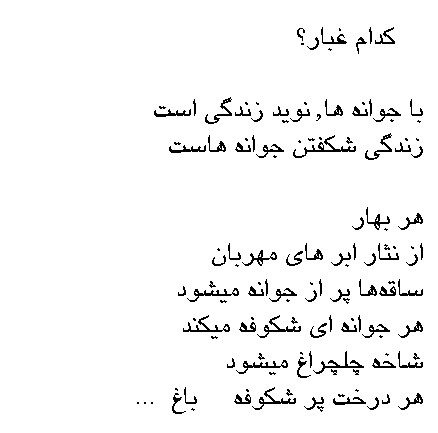
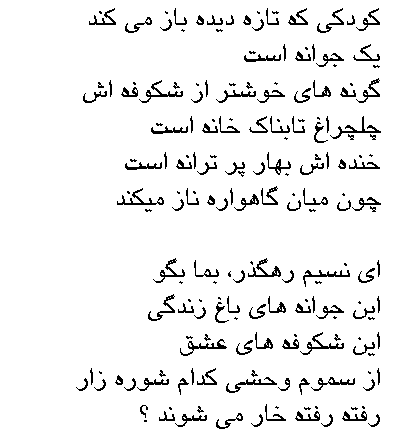
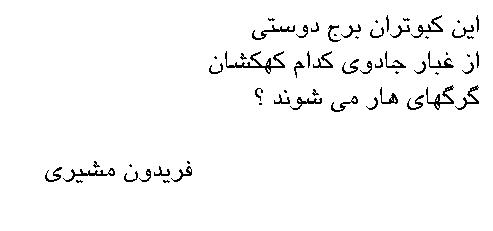
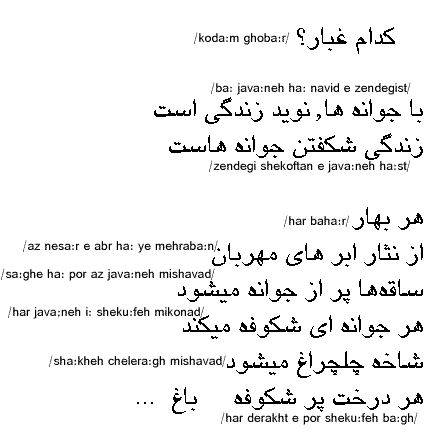
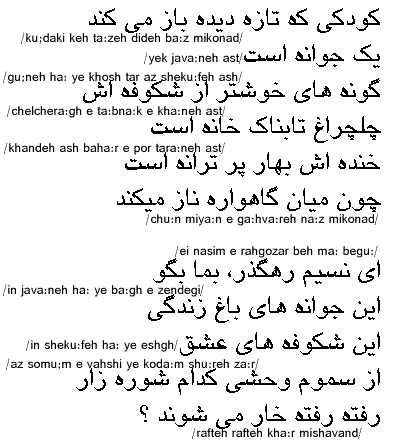
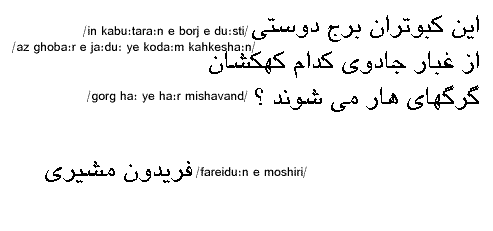
hamid
January 6, 2013 @ 7:37 pm
brother would you please mind giving line by line translation of the poem, it would be great luxury. thanks
Noor
May 30, 2013 @ 8:32 am
Translation plz
namrata
December 29, 2014 @ 2:57 pm
I am in love with this poem. I cannot thank you enough for sharing it here.
ines
February 22, 2015 @ 4:39 pm
would you please translate it for us . thanks
jasmin
March 2, 2015 @ 2:00 pm
hi
it hard to say its meaning by the word.
but he talks about the spring and new born baby.
and he surprises which dust made these beautiful things so ugly after a time.
for example flower waste and just thorn remain.
nice smile of the baby and purity of people why disappear after some time in the life?
MU RASHID
November 28, 2015 @ 9:00 am
I LIKE THIS LESSON.
tnx sir.
but some problem I faced,
‘سما’ mean ‘you’. &
‘تو’ mean also ‘you’.
what’s different in between words.
Lucie
August 24, 2016 @ 5:07 pm
“To” is informal singular and “shoma” is plural or formal singular.
so “to” for: “How are you, darling ?”, and “shoma” for “How are you children ?” and “How are you, Mr President ?”